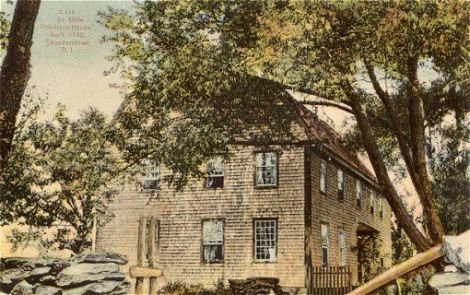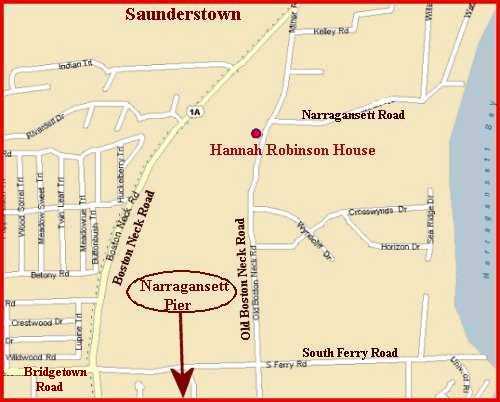![]()
Postal History Introduction
Stampless
Covers
1846
to 1900 Issues
1901-1950
Issues
1951-2003
Issues
Cancels
&
Miscellaneous
Postal
Stationery
Post
Cards
Air
Mail
First
Day &
Event Covers
Parcel Post/Special Delivery
Registered & Official Mail
Commercial & Advertising
Revenue & Postage Due
Wildlife & Game Issues
Complete List of RI Issues
|
Rhode Island Picture
Post Cards |
|
|
|
|
Originally, I was unable to find any information on this old home when I placed this page in February. Since that time; thanks to Barbara and Doug Rebok's "Early Days in Jamestown and North Kingstown," I have found out a little more about the Hannah Robinson House and its location. Map and History Follow: The Hannah Robinson House was originally built in 1710. A large two and one-half story gambrel-roofed house; it was remodeled in 1755 by Rowland Robinson, a wealthy Narragansett planter. Rowland was the grandson of the original builder and the father of Hannah. Originally the house was 105 feet long, however the old kitchen and slave quarters have been demolished and the current length is about 60 feet. The house has a central chimney and a straight line roof in the old colonial style and a pedimented doorway and gambrel roof in the Georgian style. The doorway with its fluted pilasters and broken pediment appear to date from sometime after 1755. The west bedroom, known as the Lafayette Chamber was occupied by the Marquis de Lafayette during the revolutionary war and contains the names of French officers on the window-panes. When Hannah was in her teens she was sent to a finishing school in Newport, Rhode Island. While attending this school and living with her Aunt; she met a young Frenchman named Peter Simmons, (the dance instructor at the school) with whom she later eloped. Hannah's Story; the desertion by her French lover, (when he found out she was to be disinherited), her later poverty and illness, her father's unrelenting anger, and finally her return - born on a litter carried by slaves to her father's house to die are recounted by Alice Morse Earle in the book "Old Narragansett." There is an unmarked stone at the junction of Tower Hill Road and Bridgetown Road known as Hannah Robinson's Rock. Tradition has it that Hannah, when returning to her father's house asked the slaves carrying her litter to stop here so that she might have one last look at her beloved Narragansett Country. It is said that she died the following day in her old bedroom at Hannah Robinson House. Narragansett and North and South Kingstown were home to many major plantations with large populations of slaves. A partial list of some of these slave-holding plantations and their owners follows: Rowland Robinson Plantation-Saunderstown; Silas Casey Farm-Saunderstown; Jeffery Champlin Plantation-Charleston; George Gardiner Plantation-Narragansett; Robert Hazard Plantation-Narragansett; Thomas Hazard Plantation-Narragansett, (The largest single slave owner); George Hazard Plantation-Point Judith; Henry Marchant Plantation-South Kingston; William Robinson Plantation-South Kingstown; and the Richard Smith Plantation-Wickford. Also See: Saunderstown Postal History Pages
|
![]()
RI Historical Society
The Post Offices
Home Page
RI Tercentenary Issue History
RI Philatelic Society
Recently Added Pages
Philatelic Primer
Rhode Island Around the World
Rhode Island
Town Postmarks
Other Websites of Interest

